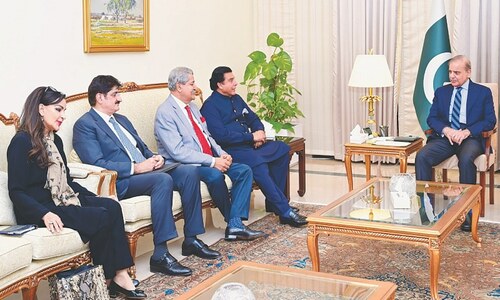 |
ISLAMABAD: Although women police officers face barriers all over South Asia, their situation in Pakistan is particularly dismal due to the fact that historically, women were rarely part of the police force.
This was the gist of a book launched by Individualland Pakistan, a non-governmental organisation, in collaboration with the European Union (EU), at a local hotel on Thursday. The book, titled ‘Rough Roads to Equality: Women Police in South Asia’, discusses the historical role of women police in the region.
The book talks about how the recruitment of women has always been a rarity in what is now Pakistan, even while the region was under British rule.
Women were first brought into the police force in 1939, and the number of women officers reached 25 constables, two head constables and one assistant sub-inspector in 1952.
In fact, it wasn’t until 1994, when then Prime Minister (PM) Benazir Bhutto established women police stations in Islamabad, Rawalpindi, Abbottabad, Peshawar, Lahore, Multan, Karachi and Larkana.
The book reveals that less than one per cent of all the police officers in Pakistan are women. As of 2012, of the total 425,978 police officers in the country, only 4,020 were women.
The book suggests that a change in the cultural attitude towards women police officers is imperative, and that this change can only come if more women are seen working as police officials.
In addition, the text states that a zero tolerance sexual harassment policy is insufficient if this policy is not practiced.
The book states that women police stations must be facilitated and well-resourced so that women police officials are able to take part in mainstream policing.
The book recommends a comprehensive reforms programme in policing.
Speaking at the launch, former interior secretary and Inspector General of Police (IGP) Kamal Shah said that during recruitment mental fitness must be examined along with physical fitness.
“If an official is not mentally strong it will become difficult for them to meet the demands of the duty,” he said.
He added that the idea that the police is a ‘force’ is a misconception.
“Police is a service… they should take it as a service, because that is the only way its issues will be addressed,” he said.
Chairperson of the Punjab Commission on the Status of Women Fouzia Viqar said that women who had joined the police force were performing far better than their male colleagues.
Former IGP Sindh Niaz Ahmed Siddiqui said there must be zero tolerance for sexual harassment.
“That is the only way women can be encouraged to join the police and work alongside male officers,” Siddiqui said.
Deputy Inspector General (DIG) of Khyber Pakhtunkhwa (KPK) Police Mohammad Ali Babakhel said that women police must be given equal opportunities.
“KPK police have given women police officers elite force training. Women police should get the proper space to perform their duty,” he said.
DIG Gilgit-Baltistan Police Farooq Azam said that more than increasing the number of woman police officials, it was imperative that they be provided with equal opportunities.
“I am not an expert on gender, but in my experience women officers are just competent as their male counterparts,” he said.
Commonwealth Human Rights Initiative Director Maja Daruwala said that women were underrepresented in higher ranks, and that there is a need to increase the number of women officers in police departments.
Individualland Pakistan Executive Director Gulmina Bilal Ahmed said that cultural attitudes towards women police officers must change.
Published in Dawn, August 28th, 2015
On a mobile phone? Get the Dawn Mobile App: Apple Store | Google Play












































